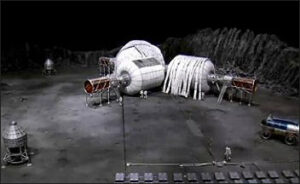The Outer Space Treaty , signed in 1967, contains language that could thwart colonization on the Moon, writes Maya Cohen, an associate at Balestriere Fariello with a background in international law, in the Above the Law blog. Article II states that “outer space, including the moon and other celestial bodies, is not subject to national appropriation by claim of sovereignty, by means of use or occupation, or by any other means.”
, signed in 1967, contains language that could thwart colonization on the Moon, writes Maya Cohen, an associate at Balestriere Fariello with a background in international law, in the Above the Law blog. Article II states that “outer space, including the moon and other celestial bodies, is not subject to national appropriation by claim of sovereignty, by means of use or occupation, or by any other means.”
The language is not not entirely clear. Writes Cohen:
What does “national appropriation” in the context of the moon mean? Does national appropriation apply to individuals and companies occupying parts of the moon or only to a nation claiming territory in space? Does appropriation by a company or an individual moving to the moon constitute national appropriation?
Based on commercial space industry practice, she suggests, the answer is no. It can be argued that private companies have been claiming territory in space for commercial satellites, with no objection from the international community. The legal question may not be settled definitively, however, until someone attempts to live or build on the Moon.

 Property rights are essential in order to establish a space industry operating beyond Low Earth Orbit, says Robert Bigelow, president of Bigelow Aerospace, and he’s seeking clarification from the Federal Aviation Administration’s Office of Space Transportation (AST) on whether a Moon habitat would have a zone of operation in which other persons are prevented from entering.
Property rights are essential in order to establish a space industry operating beyond Low Earth Orbit, says Robert Bigelow, president of Bigelow Aerospace, and he’s seeking clarification from the Federal Aviation Administration’s Office of Space Transportation (AST) on whether a Moon habitat would have a zone of operation in which other persons are prevented from entering. Property rights are essential to establishing a space industry in Low Earth Orbit, argues Robert Bigelow, founder and president of Bigelow Aerospace. And in an effort to advance the discussion on property rights, he is seeking clarification from the Federal Aviation Administration’s Office of Commercial Space Transportation (AST) on whether launching a Moon habitat allows a venture to have a zone of operation which others are prohibited from entering.
Property rights are essential to establishing a space industry in Low Earth Orbit, argues Robert Bigelow, founder and president of Bigelow Aerospace. And in an effort to advance the discussion on property rights, he is seeking clarification from the Federal Aviation Administration’s Office of Commercial Space Transportation (AST) on whether launching a Moon habitat allows a venture to have a zone of operation which others are prohibited from entering.